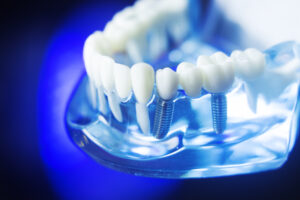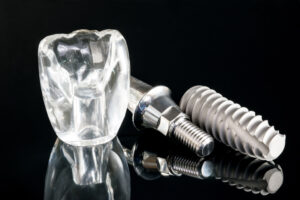At Champagne Smiles, we’re proud to be New Jersey’s Premier Dental Implant Team All Under One Roof. As dental implant specialists, we’re always happy to answer questions from our patients, and one we hear quite often is: What are dental implants made of?
Understanding Dental Implants
Before we talk about what dental implants are made of, let’s clarify what we mean by dental implants! An implant-based restoration typically has three parts: the dental implant, the restoration, and the abutment that connects the two.
Dental implants are the fixtures that are implanted into the jaw to replace the roots of missing teeth. They are not the restorations that attach to dental implants to replace the visible portion of the tooth. The materials listed below are used for the implant posts.
Materials for Dental Implants
Because dental implants are placed directly into the jawbone, they must be made from a material that is biocompatible, strong, and resistant to corrosion. Without these qualities, dental implants wouldn’t last as long as they do and they’d be likely to cause a number of health and dental issues over the years. You can rest assured that we only offer the highest quality biocompatible dental implants at our office. They are durable, resistant to corrosion, and made by leading dental implant manufacturers.
The most common materials for dental implants include:
Titanium dental implants are generally considered the gold standard. They are strong, long-lasting, and resistant to wear and corrosion. This material creates a permanent fixture with bone, which gives a restoration a high degree of stability. Titanium is also an affordable option, which is important when there are already so many costs involved in getting dental implants.
Zirconia dental implants are a newer option that is commonly used for patients who have a metal allergy. Zirconia is technically a metal, but it looks like ceramic because it’s white. Like titanium, zirconia is biocompatible and resistant to corrosion, and zirconia also has the benefit of being resistant to bacteria build-up.
The following materials are used less commonly and have lower success rates than titanium and zirconia. We do not use them at our practice:
Polymethacrylate and other polymers are sometimes used for dental implants, but they are not as durable as titanium and zirconia.
Carbon-silicon and other types of ceramic can also be used in dental implants, but because ceramic is brittle, they are not considered as strong or durable as traditional implant materials.
Dental implants can be made with stainless steel, gold, and cobalt-chromium. Each of these is durable and resistant to corrosion, but they do not have the same high success rates as titanium and zirconia dental implants.
Learn More About Dental Implants in Monmouth County
Are you interested in getting dental implants? Wondering which type of dental implant material is best for your needs? If you’re ready to start your journey to better oral health with Dr. Richard Champagne and a truly collaborative and compassionate dental team, contact Champagne Smiles in Morganville, NJ today to schedule your first appointment.




